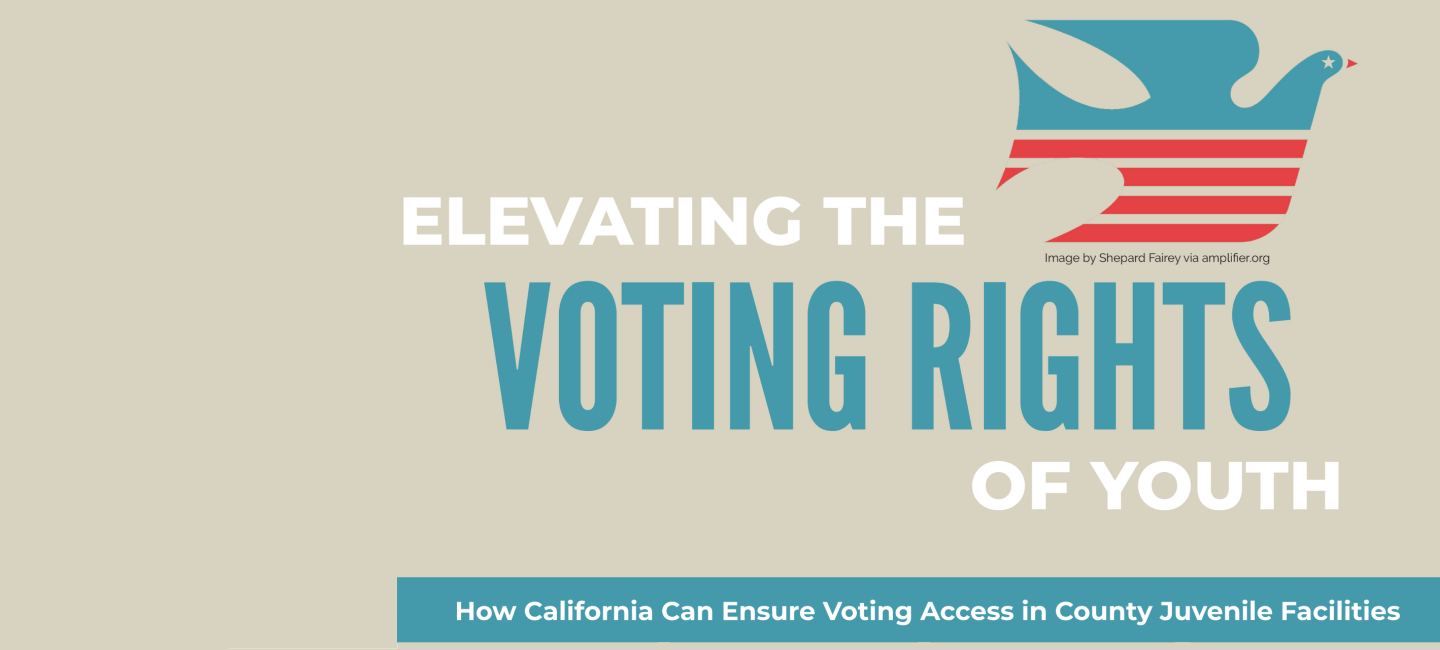Juvenile Justice, Press Releases & Announcements
New Report Issues Call To Action to Ensure Voting Access for Youth Confined in County Juvenile Facilities

For Release: April 18, 2024
New Report Issues Call To Action to Ensure Voting Access for Youth Confined in County Juvenile Facilities.
Research finds that nearly half of California counties have no formal policies to meet legal obligations for voting-age youth in their juvenile facilities.
San Francisco: Elevating the Voting Rights of Youth: How California Can Ensure Voting Access in County Juvenile Facilities, a new report by the Youth Law Center (YLC) released today, finds significant gaps in the policies and practices of county-run juvenile facilities housing a growing voting-age population. The report is the first-ever analysis of voting access for youth confined to county juvenile detention facilities.
Protecting the voting rights of youth who are incarcerated is a critical civil rights issue, given that the juvenile justice system disproportionately impacts youth and families of color, and a higher rate of youth of color are confined in juvenile detention facilities.
In addition to identifying barriers to voting, YLC makes a series of recommendations that need to be put in place before the upcoming elections to ensure that youth 18 years and older living in juvenile detention facilities can exercise their constitutional right to vote.
“Through this analysis, our report both identifies gaps in county policies and highlights promising practices that can be replicated around the state and in other states,” noted Tamar Alexanian, a Youth Law Center staff attorney and co-author of the report.
Among the report findings:
Of the 58 California counties, 40 have at least one juvenile facility, such as a juvenile hall, camp, ranch, or Secure Youth Treatment Facility, that houses youth eligible to vote. YLC requested any written resources or policies related to registration or voting in all of the 40 county’s juvenile facilities. Based on the responses, YLC found a concerning variation in policies and practices, resulting in gaps in voter protections.
Of the 40 counties that house youth confined to juvenile facilities:
- 47% of the counties, or 19 of the 40, reported no formal policies, procedures, or practices for the registration or voting of youth in the facility.
- Only 16 counties out of 40, or 40 percent, have a written policy or procedure for registration or voting for youth in juvenile detention.
- Of these 16 counties with written policies on voting, 88 percent have errors in these policies, including outdated and inaccurate legal information or information that pertains only to persons with adult convictions, not juvenile adjudications.
- Many of these inaccurate policies and materials are from a private, for-profit company that collects fees from the counties for the use of proprietary policies that misstate the law, all at taxpayers’ expense.
This link includes the responses to our Public Records Act request (PRA) to each California county – https://www.ylc.org/votingrights-cpra/.
“Studies show that voting has both individual and community benefits, and can be particularly empowering for young adults and those voting for the first time,” said Meredith Desautels, a Youth Law Center directing attorney and co-author of the report.
The voting-age population in county juvenile facilities statewide increased between 2020 and 2023, from an estimated 486 youth to 675 youth, and it is likely that this number will continue to grow. In 2023, California closed its youth prisons, leading to voting-age youth being confined in county-run juvenile facilities. Previously, youth remained in the juvenile delinquency system only up to age 21. Following recent law changes realigning the juvenile system to the county level, youth can now remain under juvenile court jurisdiction until age 23 or 25, depending upon their charges, with the possibility of an additional two years of court control. These juvenile law reforms are likely to lead to a growing proportion of voting-age youth impacted by the juvenile system.
“With this report, we hope to help counties both better understand their legal obligations and implement comprehensive voting policies that will ensure that youth who are incarcerated can access their right to vote,” adds Alexanian.
In addition to the findings, the report includes background information on the complexities of the California voting system, descriptions of laws protecting the voting rights of youth involved with the juvenile justice system, and an explanation of why access to voting is vitally important, given the recent juvenile justice reforms that have resulted in an increase in voting-age youth in county facilities.
A link to a copy of the full report is here – https://www.ylc.org/resource/votingrights-report/.
The authors of the report are available for interview and to provide additional information by contacting Natalie Reynolds at nreynolds@ylc.org.